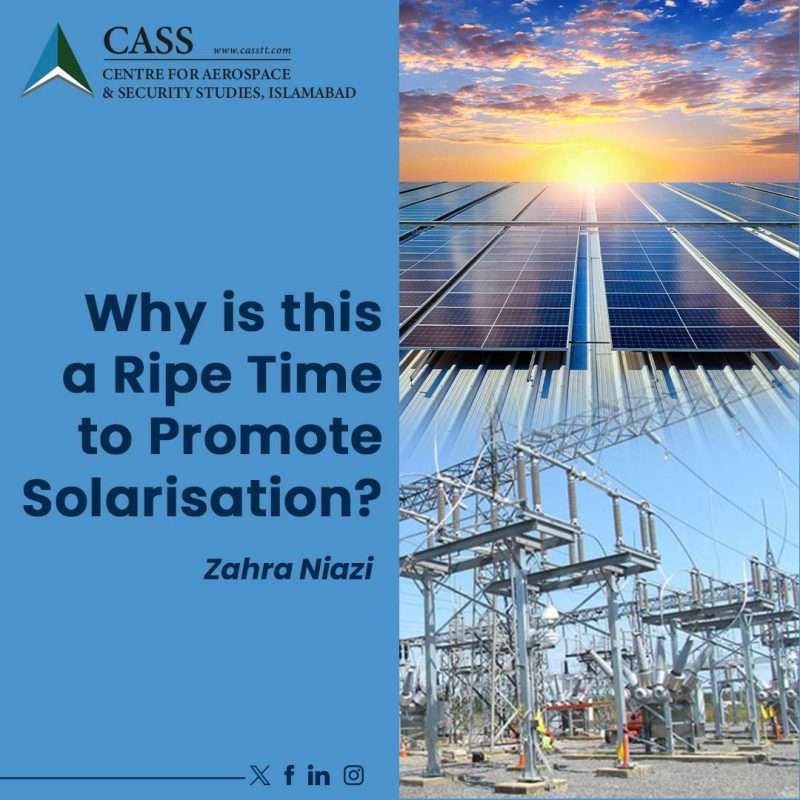A shift towards solar power use has been taking place across Pakistan recently, as declining prices of solar panels, coupled with frequent hikes in electricity tariffs, have galvanised end-consumers to embrace solar solutions. However, this rapid pace of solarisation has sparked concerns within some policy-making circles. Speculations regarding policy changes affecting solar photovoltaic (PV) participants have increased in the past couple of months. Concerns resurfaced more recently when the government halted approval of the ‘Solar Panel Local Manufacturing and Allied Equipment’ policy for the fourth time, reportedly due to a prevailing lack of consensus on whether to promote or discourage solarisation. This development came days after proposing to abolish import duty on the raw materials, machinery, and equipment to boost local production of solar panels, batteries, and inverters in FY 2024-25 budget.
At the centre of those concerns lies the argument that a greater reliance on distributed solar power generation, such as on the rooftops or at industrial sites, has reduced the demand for traditional grid-based power. As a result, the government’s idle capacity payments were rising, contributing to higher electricity tariffs for consumers in order to maintain revenue levels, and placing a fiscal burden on the exchequer. For context, the state’s contractual obligations with Independent Power Producers (IPPs) obligate it to make guaranteed capacity payments to them to maintain power generation capacity, irrespective of whether it receives electricity from them or not. The bill for these capacity charges is shared between the government through subsidy payments and power consumers through electricity bills.
However, any attempt to slow down the current pace of solarisation, instead of addressing the root cause of the capacity payment burden, will be a missed opportunity. To many, installing an on-site solar generator seemed like a long-term ambition even half a decade ago. Solar energy systems were prohibitively expensive, making them a luxury accessible to only a few. But today, solar PV systems have become affordable for many more segments of society, if not all. From PKR 80 per watt in 2022, solar panel prices in Pakistan have dropped by more than half to PKR 37 per watt, following declining prices within the international market and bulk imports from China.
For reference, the import of solar panels in Pakistan rose from 2.8 Gigawatt (GW) in 2022 to 5 GW in 2023; and between January and December 2023, solar PV module spot prices in the international solar market dropped by almost 50% year-on-year. Underlying this trend is the overproduction of clean energy technologies by Chinese firms following years of demand growth. The global solar market now faces a ‘supply glut,’ where the supply of solar equipment and technologies, particularly solar panels, has exceeded demand. The International Energy Agency predicts that, in the coming years, the dynamics of oversupply will continue to depress solar panel prices, and global solar panel supply may reach a level three times more than demand by the end of the current year.
Under this context, the only rational decision is to facilitate solarisation by harnessing the opportunities offered by the current dynamics within the solar market. The 17% General Sales Tax (GST) waiver on imported solar panels, implemented in 2022, was a pragmatic move and must be maintained. Strategies should also be pursued to minimise avoidable import costs, such as by streamlining and improving customs procedures and clearances or reviewing the import routes and modes of transportation, among others. Any market manipulation of domestic prices must be regulated to ensure that the price benefits are passed on to consumers. Additionally, surplus domestic supply due to the opportunity for bulk imports can be capitalised on to expand initiatives to offer free-of-cost solar PV systems to economically disadvantaged segments of society, as being planned by Punjab and Sindh governments, or to boost renewable energy usage in the agricultural sector, such as by extending the agri-tube-well solarisation project. Simultaneously, determined efforts are also needed to develop the domestic solar equipment manufacturing industry centred on innovation and technological advancement.
The heavy burden of fixed capacity payments to IPPs has been a long-standing issue and requires sustainable solutions rather than short-term fixes. A policy shift is needed to foster a competitive electricity market, allowing market dynamics to determine the development and growth of power generation capacities. Available generation capacity can be utilised by addressing transmission and distribution inadequacies and channelling unutilised capacity into other productive activities (e.g., expanding electric vehicles (EV) charging infrastructure capacities to boost electric mobility before a large-scale solar PV charging infrastructure can be deployed).
Pakistan’s current energy systems are not just unsustainable and environmentally unfriendly but also a source of chronic energy crises. Furthermore, as the world moves towards renewable energy sources due to the impacts of a rapidly warming planet, solar needs to become an indispensable part of the country’s energy security mix. Any attempt to slow down the current pace of solarisation will only delay the inevitable while pushing Pakistan behind in the global shift towards a cleaner, cheaper, and sustainable future.
Zahra Niazi is a Research Assistant at the Centre for Aerospace & Security Studies (CASS), Islamabad, Pakistan. The article was first published in the Daily Times. She can be reached at [email protected].





